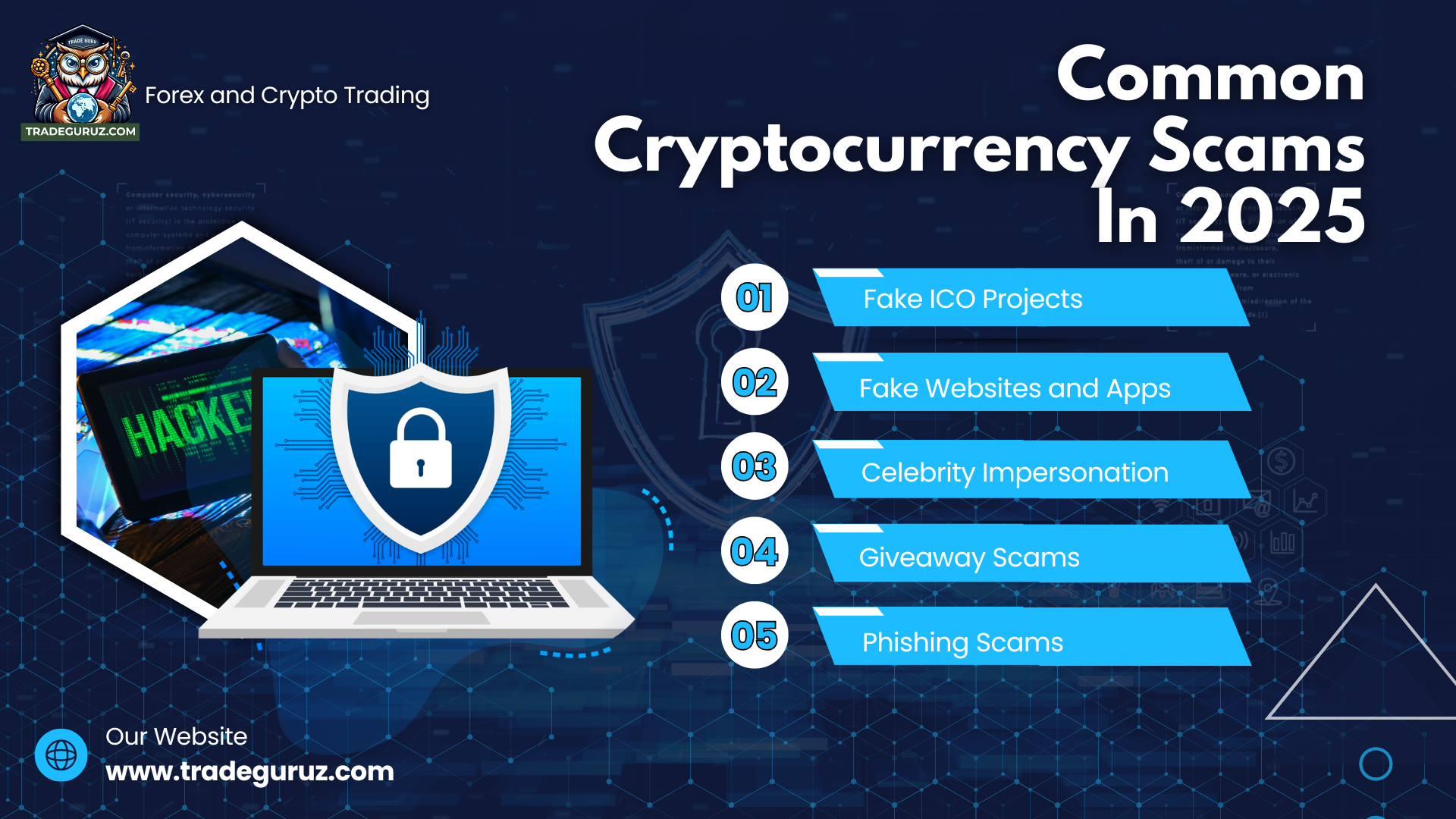



Cryptocurrency is an emerging industry that has drawn massive attention from investors in recent years. Alongside the potential for high profits, there are also significant risks. Crypto scams are one of the biggest threats. If you are interested in cryptocurrency, it is essential to understand these risks. Keep reading to learn about the most common crypto scam tactics and how to stay safe in the crypto world.
As cryptocurrencies boom, so do cryptocurrency scams. A crypto scam is a form of investment fraud in which criminals use deception to target crypto investors to steal digital assets and personal information or trick people into taking actions that benefit them. In 2024 alone, the total number of cryptocurrency scams worldwide was 58,200, causing losses of up to $5.9 billion.
The nature of virtual currency is fast volatility. Scammers often exploit this to pressure people into making quick decisions without careful consideration. Virtual currency operates independently without being controlled by any agency, creating favorable conditions for scammers to commit fraudulent acts. Moreover, digital assets can be transferred worldwide anonymously, making them an ideal target for cybercriminals. Once it is lost, it cannot be recovered. These factors explain why the cryptocurrency market is a fertile ground for bad guys. And scammers do not just target beginners; experienced investors can also fall victim. Below, we will look at the most common tactics scammers use today.
While blockchain technology and crypto security tools have improved, cryptocurrency scams have become more sophisticated than ever. Below are the most common forms of fraud that have trapped countless investors.

Initial Coin Offerings (ICOs) are a way for crypto startups to raise capital by selling new tokens to early investors. Unfortunately, fake ICOs have become a notorious scam in the crypto industry.
These fraudulent projects often paint a bright future for a new coin with promises of dozens of times growth and exclusive incentives. Scammers design the project’s website to look professional, add a whitepaper, and “label” the founding team as graduates of prestigious schools or former employees of large companies. At first glance, everything seems legit, but if you dig deeper, you will find red flags: vague information, no actual product, and unverifiable team identities. Once the scammer lures in the victim and secures a large enough investment, they quietly disappear, leaving investors “with nothing but worthless tokens”.
Another common scam involves creating websites or applications that are 99% identical to the original. Scammers carefully copy everything, from the logo and interface to the user experience, making it hard for users to tell the difference. Only when paying close attention will users notice subtle details, such as a slightly different web domain or an app interface missing advanced features, along with font and image errors.
If you enter your private keys or login credentials on these fake platforms, hackers can drain your wallet within seconds. Worse still, some apps have even made their way onto the Google Play Store or Apple App Store, tricking thousands of users into downloading them before being taken down.

People tend to trust celebrities and well-known figures in the crypto space. Scammers exploit that trust to commit fraud. They create fake profiles using stolen images, videos, or even edited livestreams of influencers like Elon Musk, Vitalik Buterin, or Changpeng Zhao. Then, through platforms like Twitter, Facebook, or Telegram, these accounts call on the community to join a new project or sell non-existent virtual currencies to new investors. Because the names behind them are familiar and trusted, many people trust and follow the scammers' words, only to lose money and get in trouble.
Everyone loves money, and scammers know it. In giveaway scams, scammers often ask you to send a small amount of money and promise to send you double or triple the amount you sent back. They emphasize it as “once-in-a-lifetime”, with messages like “This opportunity is only available today!” to create urgency. Victims are encouraged to act fast, without doing any research. Despite various warnings, numerous people still fall into the trap because they think they are “lucky” to be chosen. But no one gives anything away for free. Once you send your crypto, you lose it for good. Not only do you not receive the promised return, but your cryptocurrency wallet address may also be targeted again in future scams.
Phishing is a form of fraud that exploits users' lack of vigilance through channels such as email, SMS, or browser push notifications. Fraudsters often send urgent messages such as “Your account has unusual signs” or “unverified transaction, please confirm now,” with a link. Users who click these links will be directed to a fake website and asked to enter private key information. Once you enter your private key or password, hackers will have your private key in their hands. And then your assets disappear without a trace.
While these scam tactics can be extremely sophisticated, in general, there are still loopholes as follows:

You receive unexpected contact via phone, email, social media, or text. They claim to be a broker, investment expert, or representative of a well-known project, and invite you to participate in a potential project with attractive incentives. If you have not initiated contact before, always be suspicious of these messages.
You are promised incredibly high returns with little or no risk. These scams often offer “guaranteed” profits. However, in investing, profit always comes with risk. No financial investment can guarantee future returns. If it sounds too good to be true, it is likely the beginning of a scam.
Scammers tell you that this investment opportunity is only available to you. They are skilled at making victims feel “special” by saying the deal is “only for you.” That said, the same pitch is sent to thousands of people in reality.
You are pressured to make a quick decision. Criminals often put pressure on you by setting very short deadlines like “only available today” to push you into acting without thinking. And this sense of urgency increases the risk of poor decision-making.
These red flags may appear one at a time or all together, but if you notice one of them, stay alert and verify everything carefully.
Cryptocurrency scams spare no one. Anyone can fall victim. It is advisable to equip yourself with the necessary skills to face advanced scams. So, how do you protect yourself from scams? The answer will be revealed immediately.

Your wallet’s private keys are the gateway to your funds. Never share your recovery phrase or private keys with anyone. If you use a hot wallet, only connect it to trusted platforms. For maximum security, consider a cold wallet, which stays offline and is far less vulnerable to hacks.
Before investing in anything, take the time to learn about it. If you do not understand how it works, you are more likely to be out of control if something goes wrong. It is best to do your research before deciding whether or not to invest.
Pressuring you into quick decisions is a classic move in a frauder’s playbook. They do not want to give you time to think or verify their claims. If you feel pressured to act immediately, take a step back. In the crypto market, one rushed decision can wipe out your portfolio.
Knowledge is your strongest defense. Stay updated on blockchain technology, cryptocurrency trends, and the latest scam tactics. Cybercriminals are constantly sophisticated, and your awareness should be too. Only your own understanding can protect you from all attacks.
Cryptocurrency scams are evolving in endless varieties. Anyone can be the next victim. Do not eliminate yourself from the risk of being attacked. Nothing is impossible. Without the necessary knowledge and skills, you could become the next target of a crypto scam. Sometimes, just a moment of inattention is enough to cost you all your digital assets.
Thank you for spending your time reading this article.
For more information, please contact us at TRADEGURUZ.